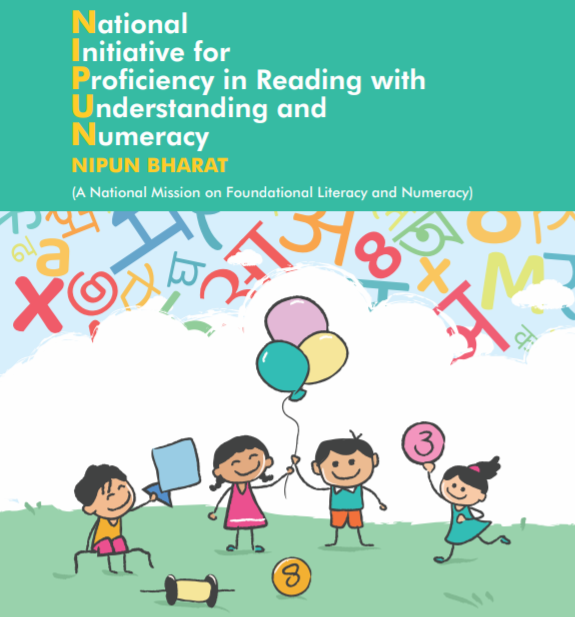Description

Copyright infringement is not intended
Context: The Ministry of Education chaired the review meeting on Nipun Bharat Scheme.
About Nipun Bharat Scheme
- The Ministry of Education has launched the National Mission on Foundational Literacy and Numeracy called National Initiative for Proficiency in Reading with Understanding and Numeracy (NIPUN Bharat) in July 2021.
- NIPUN Bharat Mission has been launched under the aegis of the centrally sponsored scheme of Samagra Shiksha.
- The Department of School Education and Literacy, Ministry of Education (MoE) will be the implementing agency at the national level and will be headed by a Mission Director.
- The Ministry of Education has launched NIPUN Bharat, for ensuring that every child in the country necessarily attains foundational literacy and numeracy (FLN) by the end of Grade 3, by 2026-27.
- The mission will focus on children of the age group of 3 to 9 years including preschool to Grade 3.
- The children who are in Class 4 and 5 and have not attained the foundational skills will be provided individual teacher guidance and support, peer support and age appropriate and supplementary graded learning materials to acquire the necessary competencies.
Objectives of NIPUN Bharat
- It will focus on providing access and retaining children in foundational years of schooling; teacher capacity building; development of high quality and diversified Student and Teacher Resources/Learning Materials; and tracking the progress of each child in achieving learning outcomes.
- The goals and objectives of the mission are required to be achieved by all Govt., Govt. Aided and Private Schools so that universal acquisition of FLN skills can be achieved by 2026-27.
- To ensure an inclusive classroom environment by incorporating play, discovery, and activity-based pedagogies, linking it to the daily life situations of the children and formal inclusion of children’s home languages.
- To enable children to become motivated, independent and engaged readers and writers with comprehension possessing sustainable reading and writing skills.
- To make children understand the reasoning in the domains of number, measurement and shapes; and enable them to become independent in problem solving by way of numeracy and spatial understanding skills.
- To ensure availability and effective usage of high-quality and culturally responsive teaching learning material in children’s familiar/home/mother language(s).
- To focus on continuous capacity building of teachers, head teachers, academic resource persons and education administrators.
- To actively engage with all stakeholders i.e., Teachers, Parents, Students and Community, policy makers for building a strong foundation of lifelong learning.
- To ensure assessment ‘as, of and for’ learning through portfolios, group and collaborative work, project work, quizzes, role plays, games, oral presentations, short tests, etc.
- To ensure tracking of learning levels of all students.
Foundational literacy: The pre-existing knowledge of language helps in building literacy skills in languages. The key components in Foundational Language and Literacy are:
- Oral Language: Development Includes improved listening comprehension; oral vocabulary and extended conversation skills. The experiences in oral language are important for developing skills of reading and writing.
- Decoding: Involves deciphering written words based on understanding the relationship between symbols and their sounds.
- Reading Fluency: Refers to the ability to read a text with accuracy, speed (automaticity), expression (prosody), and comprehension that allows children to make meaning from the text. Many children recognize aksharas, but read them laboriously, one-by-one.
- Reading Comprehension: Involves constructing meaning from a text and thinking critically about it. This domain covers the competencies of understanding texts and retrieving information from them, as well as interpreting texts.
- Writing: This domain includes the competencies of writing aksharas and words as well as writing for expression.
Foundational Numeracy: Foundational Numeracy means the ability to reason and to apply simple numerical concepts in daily life problem solving. The major aspects and components of early mathematics are:
- Pre-number concepts: Count and understand the number system.
- Numbers and operations on numbers: Learn conventions needed for mastery of Mathematical techniques such as the use of a base ten system to represent numbers.
- Shapes and Spatial Understanding: Perform simple computations in her/his own way up to three-digit numbers and apply these to their day to life activities in different contexts.
- Measurement: Understand and use standard algorithms to perform operations of addition, subtraction, multiplication and division on numbers up to three digits.
- Data Handling: Identify and extend simple patterns starting from repeating shapes to patterns in numbers, interpret simple data/information in his/her daily life activities.
Way Forward
- Foundational skills enable to keep children in class thereby reducing the dropouts and improve transition rate from primary to upper primary and secondary stages.
- Activity based learning and a conducive learning environment will improve the quality of education.
- Intensive capacity building of teachers will make them empowered and provide greater autonomy for choosing the pedagogy.
- Holistic development of the child by focusing on different domains of development like physical and motor development, socio-emotional development, literacy and numeracy development, cognitive development, life skills etc. which are interrelated and interdependent, which will be reflected in a Holistic Progress Card.
- Children to achieve a steeper learning trajectory which may have positive impacts on later life outcomes and employment.
- Since almost every child attends early grades, therefore, focus at that stage will also benefit the socio-economic disadvantageous group thus ensuring access to equitable and inclusive quality education.
https://www.pib.gov.in/PressReleasePage.aspx?PRID=1807639












